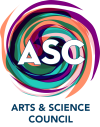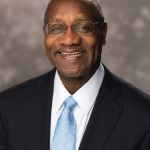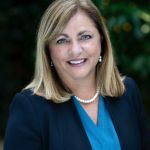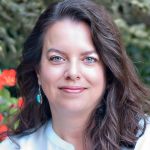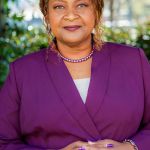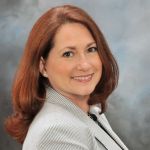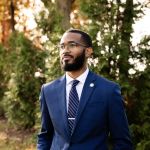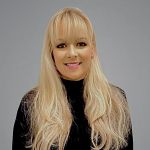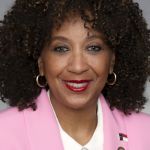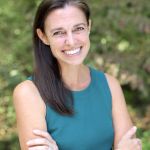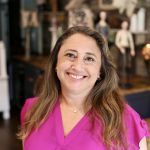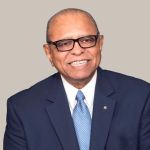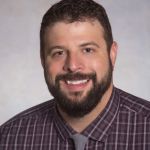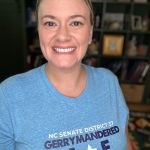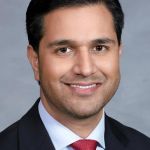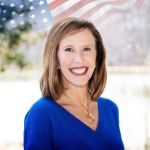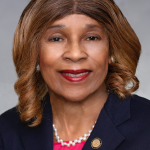Fall 2024 ASC Candidate Survey
Ahead of Election Day 2024, candidates running for election for Mecklenburg Board of County Commissioners, North Carolina House of Representatives, and North Carolina Senate were provided a five-question survey to complete and share their position on arts and culture. Below are the verbatim responses we received, grouped by question.
Respondents running for Mecklenburg Board of County Commissioners
Arthur Griffin, Jr.: I helped Dr. Bertha Maxwell-Roddey and Dr. Mary Harper in the early 1970’s in the creation of the Afro-American Cultural Center located at Little Rock AME Zion Church. I grew up in the First Ward Community.
Yvette Townsend-Ingram: Arts, science, and history are my preferred ways to connect with my community, particularly the Black history of Charlotte. As a former CMS educator, as well as a resident of Mecklenburg, I have seen the talents and unforgettable history through artwork that has been supported by the ASC.
Angela White Edwards: History of Springfield Community was a rich atmosphere of family values then it was taking away with drugs, new people moving with no love. Trying to rebuild the community as I type.
Laura Meier: When I was teaching high school in a drop-out prevention program in CMS, we received a grant from the Arts and Science Council for a huge project that encompassed every subject we were teaching in the program—English, math, social studies, technology, science, art. It was a big undertaking. The students spearheaded a play that they wrote and directed, designed the costumes and the props and scenery/backdrops, organized the location (Spirit Square) and learned lighting and sound, and directed each of those as well. Of course, this was all with the direction of artists who were part of this grant. It was probably the hardest thing I ever have been involved in as a teacher. There were tears and arguments, kids quit and came back. There was laughter and camaraderie, high fives and successes. It was actually very stressful. And in the end, the kids put on a play. They did it. They wrote, produced, directed, designed, budgeted, spent money, saved money, invited and greeted guests. There was a part for everyone. I am confident when I say none of these kids would have ever been exposed to this whole process if it wasn’t for that grant from the Arts and Science Council.
Jim Marascio: I appreciate how art and architecture in public and common spaces change the environment to inspire, cause me to think, and appreciate design. Cultural festivals, such as Festival in the Park, the Yaisou Greek Festival, and Ciao Italia help to expose me to the cultural diversity within the Charlotte area through the opportunity to explore food, music, and crafts that I wouldn’t normally experience.
Susan Rodriguez-McDowell: The arts are a special connection point for me. My Bachelor’s degree is in Fine Arts. I studied drawing, painting and photography at UNC Charlotte. My life continues to be profoundly impacted by art. Several months ago I visited an exhibit at the VAPA Center that was centered around the evils of the holocaust and how some communities have terrorized others since then. This kind of work has so much to teach us about ourselves, no matter what our background. I was moved by the storytelling, the visual beauty, the contrast with the horror, and the message of the works.
(For example: advocate for increased investment, attend cultural events or Culture Blocks programs, address needs of local creatives, support School Funding Opportunities, etc.)
Arthur Griffin, Jr.: As a County Commissioner, I intend to advocate and support equity, diversity of funding and participation.
Yvette Townsend-Ingram: I currently serve on the board of directors for an organization that will bring the first independent Afro-Latino Culture Museum to Charlotte. It is my desire to begin there and continue to promote art and culture programs that help our community to understand its legacy. Doing so is a critical step in decreasing violence per all statistics. Art is also a proven catalyst of improved academic performance in schools, especially reading, math, and science. I currently work closely with CMS to improve those areas of education and funding through the ASC is critically important.
Angela White Edwards: I would love to have an event to raise for Southwest Movement,they have really helped out Community
Laura Meier: I would like to prioritize fully funding the ASC, making sure the arts are accessible for hard-to-reach communities. I recognize the importance of the arts as not only a cultural outlet, but also as a therapeutic outlet for those struggling with mental health. This need was exposed during the pandemic and I hope to see the arts utilized more in this respect. Mecklenburg County majorly funds Culture Block programs, and though I am interested in all facets of the arts in the county, I am particularly interested in these programs. I feel that the arts continually take a hit from funding sources, and funding these grants is key to bringing art into the neighborhoods to help expose our residents to the joy of art. The BOCC should prioritize children and adults gaining more access to the arts as part of our own board priority of reducing racial disparities.
Jim Marascio: As the next county commissioner representing District 6, I will prioritize the conservation of current cultural sites within the county, economic development that brings companies and individuals from around the world, and the continuation of the cultural events currently present within the community.
Susan Rodriguez-McDowell: Engagement with art, science and history should be readily available to all no matter their walk in life or zip code – it should not be a series of isolated experiences. It should be valued in our schools on a similar par with sports and academics. It needs to be part of our fabric. Artists are extremely important to a healthy economy. Mecklenburg needs to have ample spaces and opportunities for artists to grow in their areas of expertise. Many artists are also entrepreneurs that contribute to our economy and may need small business support. I will continue to advocate for artists and to push for equitable access and representation for underrepresented arts organizations.
ASC recognizes that systemic, inequitable access to opportunity has led to generations of unjust outcomes for those who have been historically marginalized in mainstream arts and cultural funding, discourse, leadership and resource allocation. We strongly encourage all who serve or seek to serve our community to read ASC’s inaugural Cultural Equity Report and second Cultural Equity Report, which reflect the steps we have taken on our journey to becoming a more equitable organization.
Arthur Griffin, Jr.: I will use my voice and vote to insure equitable voices serve in a governance and leadership role.
Yvette Townsend-Ingram: There is no shortage of talented artists or content creators in Mecklenburg County. There is a shortage of money and venues that will support them and help them to become independent artists. I am a seasoned, accomplished researcher and grant writer. Collecting data to document how art and culture, particularly the ASC, supports education is the best way to secure federal and state grants that can provide funding and assist with removing barriers for artists who need support.
Angela White Edwards: Second Cultural Equity Report, to under a multi community with different cultures and nationalities
Laura Meier: I respect that the ASC took a deep look at its history and since has resolved to create a more inclusive and equitable community for the arts. I support the recommendations found in the Cultural Equity Report, particularly identifying and funding “initiatives to increase program access, including discounted or free admissions, to underserved populations.” I believe that the county must continue to support programming–including Culture Block Grants–to reach all of our residents, particularly those who are underserved. I support the Charlotte Symphony on its creative ways to reach our residents where they are by bringing the symphony to our neighborhoods. I support thinking outside the box. I am also a strong advocate for Arts+ for students who would otherwise not be able to have access to arts instruction. I am proud the county is a funder of such a strong and innovative program.
Jim Marascio: Appreciation for arts and culture begins in our schools. As a county commissioner, I would support arts and cultural initiatives and curriculum within CMS, inclusive of field trips for students to experience arts and culture outside the classroom.
Susan Rodriguez-McDowell: I will continue to advocate for diverse representation on the city-county arts governing board and grant making boards. It is important to me that ASC is recognized for the tremendous progress it has made in this area as it continually strives for more.
It is important to independent creatives and residents working in the cultural sector that elected officials make efforts to understand and address their specific needs, interests, and perspectives.
Arthur Griffin, Jr.: Let’s talk. I have an open-door policy and invite all interested in moving equitable cultural arts opportunities forward to communicate with me.
Yvette Townsend-Ingram: As an At-Large member of the BOCC, my top priority is to have a genuine two-way communication with all constituents, including the five towns. It is priority number one listed on my materials and website. I don’t want to use traditional modes of communication, like newsletters, but different modes, like an Arts & Culture townhall, or a monthly podcast with two-way conversations. I am also open to suggestions from the arts & culture community.
Angela White Edwards: But above all teaching each cultural of people positivity in living together and helping other to strive in your potentials
Laura Meier: I believe that our local, small artists were left out of recovery plans and I think that it was wrong. Even with ARPA funds, our hands were tied by the federal government, and we were unable to award arts groups with the funds necessary to recover from the pandemic. The county has to do better and recognize the importance and impact of local artists and I do think that we on the BOCC must speak up and advocate better for them. I support the new funding structure and the county’s increased involvement in the arts and hope the smaller sectors of the arts in Mecklenburg County get more attention than before.
Jim Marascio: I support public-private partnerships to promote and support arts and culture within the community.
Susan Rodriguez-McDowell: I will always continue to listen to artists and leaders in the arts community. Promoting artists and paying them for their work is a priority. Showing up to arts events and participating in our local cultural life is important to me.
In FY24, ASC invested $2.2 million in nonprofit organizations of all sizes and $2.1 million to support the creative individuals of Charlotte-Mecklenburg. Mecklenburg County’s funding was critical in making these historic investments. According to the most recent Arts & Economic Prosperity Study, in 2022 Mecklenburg County nonprofit arts and culture organizations and their audiences generated $453.8 million in local economic activity, supported 6,815 jobs in Charlotte-Mecklenburg, and generated $81.4 million in local and state tax revenue. Research consistently shows that the arts and cultural sector contributes to quality of life and economic stability of the local community.
Arthur Griffin, Jr.: I voted to fund ASC with $11M this year.
Yvette Townsend-Ingram: As previously noted, I am an accomplished researcher and grant writer. I know the importance of tying data to funding proposals so I will ensure that there is a way to collect data that demonstrates how impactful the arts in all its various forms are to improve and advance education so that there are consistent funding sources.
Angela White Edwards: After removing the ugly in our communities, then will should put beauty in
Laura Meier: I will fully support funding of the Arts and Science Council. I had the opportunity to work with Hannah Hassan and her students through Arts+/Studio 345 on a storytelling project with elected officials and students. It was simply inspiring to work with such talented students who, I am confident, would not have been given the opportunity to express their talents had it not been for Arts+/Studio 345. It was a remarkable experience. It cemented my support of local artists and art groups who don’t get much notice. I am thrilled that the county stepped up to help fund the Charlotte Museum of History. This is the first public funding for the museum and I’m proud the county is leading the way. The county also supported the Picasso exhibit (with my urging) and were able to advocate for free admission for school children an others. It was a valuable experience for Charlotte and beyond.
Jim Marascio: As a fiscal conservative, I prioiritize the outcomes of the programs that our public dollars are spent on. While Arts and Culture funding isn’t among my top priorities, if we can show how it is producing results, I will continue to provide support.
Susan Rodriguez-McDowell: As an incumbent commissioner, I have voted for increased arts funding in the FY2025 Budget and special programs over the years. It is obvious that the arts are an economic engine which generate a huge return on financial investment. Also, I gained the support of my colleagues to sponsor a play with the Children’s Theater to bring special programming to all 4th graders in CMS last year which was a crossover of priorities for me as children’s mental health and well-being is another top priority. I will continue to support investment in the arts, culture and history because I believe the arts are an important part of the fabric of our lives.
The following candidates for the Mecklenburg Board of County Commissioners did not respond to ASC’s Fall 2024 Candidate Survey:
Leigh Altman (At-Large)
Elaine Powell (District 1)
Aaron R. Marin (District 1)
Vilma D. Leake (District 2)
George Dunlap (District 3)
Mark Jerrell (District 4)
Arthur McCulloch (District 5)
Respondents running for North Carolina House of Representatives
Melinda Bales: Music has always been a part of my life. It was my sanctuary. It still is! Music gave me a connection to the people around me. It was a way to communicate thoughts and feelings with those I did not know.
Beth Gardner Helfrich: I grew up in a family of performers and teachers right here in Mecklenburg County. My father (set designer), uncle (actor), and aunt (stage manager) were all mainstays at Charlotte Repertory Theatre during the 1990s. A formative memory for me was opening night of Charlotte Rep’s production of Tony Kushner’s Angels in America: The cast was preparing for arrest when a district court judge ruled that the show could go on. As a sophomore in high school, I had a front row seat for the tumultuous, public intersection of art and politics, progress and backlash. The show received critical and public acclaim, but in response, Mecklenburg’s County Commissioners voted to strip funding from the Arts and Science Council. I went on to study acting at Davidson College, spent one year touring North Carolina public schools with Children’s Theatre of Charlotte as a Tarradiddle Player, and then taught English and theatre in middle and high schools. I cannot overstate the importance of the arts in my life and in the lives of students across North Carolina.
Nasif Majeed: On numerous occasions, I have participated with community organizations that were the beneficiaries of performances connected to the Arts & Science Council. Most recently in the Hidden Valley Communities’s annual National Night Out activity.
Rob Yates: It is hard to overstate the profound impact art has had on my life. I consider myself a writer, both by passion and by trade. I started out writing poetry in fourth grade and I never stopped. I expanded the breadth of my appreciation for the arts, including music, theater, all types of visual art, performance art, and every niche form of art I have encountered. Art is the manifestation of a cultural zeitgeist, like a shared dream. In its purest forms, art is honest, unapologetic, and forceful. It demands a response and usually receives one. When art reflects the voice of a people who are being crushed under the stifling tyranny of a wayward state, then it is also revolutionary and subversive. In this context, as my political ideology was forming in high school and college, punk rock and hip hop connected me with that voice of hope and rebellion and helped me realize the urgency of the Libertarian message.
Julia Greenfield: As a nurse, my background in healthcare has helped me to engage in my community on important issues such as health education, reproductive rights and access to care. Art can also be a powerful medium to raise awareness about complex issues like the struggles of rape/incest and can help to tell the stories that build solidarity and compassion. Shared historical experiences, such as the fight for women’s rights or healthcare reform can unite a community by educating others about the history of women’s health, which can foster a sense of shared purpose and belonging.
Carolyn G. Logan: My son is very good in painting and drawing. I got him some not an art school and was able to see how artists bond with each other. He helped in a project that use to be on Trade Street in Charlotte. Just seeing how talented he is brought me joy and seeing how artists are able to express themselves through their talents is the reason I see the need for arts science and history which my daughter majored in and speaks as if she lived those times. Art is very important to the community.
Nicole Sidman: The easy answer is the Picasso Landscapes exhibit at the Mint Museum, which included the important addition of the works of local Charlotte artist Romare Bearden. It was an excellent way to take an international exhibit and connect it back to all of us in the Queen City. Additionally, I experience these connections every day as an employee at a local non-profit (Director of Congregational Life at Temple Beth El). The importance of art, culture, and history in our community is immeasurable, and I am proud to represent my congregation at cultural events within the Charlotte community. Being part of a vibrant Jewish community in Charlotte committed to the arts, culture, and our history has enriched my life in countless ways.
Jordan Lopez: Arts, science, and/or history have helped me connect with my community in a variety of ways. Thinking about events such as Local Street that not only showcased Charlotte’s extremely talented underground artists, but it also allowed for the greater Charlotte community to come together at spaces like the Mint to celebrate their work. Additionally, the Charlotte Museum of History is located within our House District, and I’ve enjoyed attending several events on their campus over the years; most recently the opening of the Siloam School. Events and spaces like these allow for our community members to interact with each other and to learn more about the history of the city and communities we love.
(For example: advocate for increased investment, attend cultural events or Culture Blocks programs, address needs of local creatives, support School Funding Opportunities, etc.)
Melinda Bales: I will certainly be supporting school funding opportunities. For many children, this is their outlet. It is the way they not only connect with the world around them, but it also helps to build within them confidence, the ability to work together as a team and self-expression.
Beth Gardner Helfrich: I plan to be a champion for arts and culture initiatives, broadly, but as a former teacher and mom of current CMS students, I am particularly supportive of programming and funding that connects PK-12 students with the arts, science, history, and culture.
Nasif Majeed: To advocate for and support funding bills that invest in the arts community statewide.
Rob Yates: Government support of art necessitates that there is some bias in choosing which art to support. This can range from favoring certain art forms, topics, or artists while neglecting or actively opposing others. This undermines the purity and honesty of art. If elected, I will never waver in my defense of our freedom of speech, and I will make sure the art community is allowed to freely express itself through art. Same as I do now, I will do everything I can with whatever platform I have to elevate and promote art and artist that I encounter.
Julia Greenfield: I would love to promote arts and sciences as tool for social change, by supporting artists and creative projects that address social issues, including women’s rights, reproductive health, racial equality and climate action. I would support initiatives that allow marginalized voices to tell their stories through art, by partnering with local galleries, theaters and community spaces to host exhibitions, performances and workshops that explore themes like gender equality, body autonomy and social justice.
Carolyn G. Logan: I am a member of The NCGA’s Art Caucus, we listen to need for funding and improvement in the arts community
Nicole Sidman: I believe schools should fully fund arts, music, and cultural activities as part of our entire educational funding package. Making sure we not only have vibrant arts programs in our public schools, but also the arts graduates and degree holders to teach them in the future, is part of the key reason I’m running: to fully fund public education and support our schools.
Jordan Lopez: My arts and cultural priorities are focused around accessible programming and the funding needed to support them. Not only for local creatives themselves to be able to access programming at our cultural facilities and/or in other community events centered around art, but for children across the city and state as well. There’s a program at the NC Museum of Art named “Artists in Mentorship”, or AIM, that I would love to see continue receiving support. The AIM program places a qualified local artist and classroom facilitator with students interested in art for a ~6 week program that builds up to an art project. I will use the successes from the AIM program to advocate to my colleagues about the effectiveness of programs like this when connecting with children and giving them additional opportunities to express themselves.
ASC recognizes that systemic, inequitable access to opportunity has led to generations of unjust outcomes for those who have been historically marginalized in mainstream arts and cultural funding, discourse, leadership and resource allocation. We strongly encourage all who serve or seek to serve our community to read ASC’s inaugural Cultural Equity Report and second Cultural Equity Report, which reflect the steps we have taken on our journey to becoming a more equitable organization.
Melinda Bales: Public funding for Arts and culture faces many of the same challenges as numerous other worthy non-profit organizations. North Carolina has a total of more than 11,800 nonprofit organizations with revenues over $50,000. Competition for public dollars is greater than ever. I’ve been an advocate for arts and culture during my municipal service and will continue that in NCGA in whatever capacity possible.
Beth Gardner Helfrich: I’m grateful for the work of the ASC in addressing systemic inequities through self-study and concrete, measurable progress. I would work in partnership with arts and culture groups in the north end of Mecklenburg to promote access in our schools and advocate for funding with equity in mind.
Nasif Majeed: I have and will work with our local arts community to inform and educate for cultural equity in order to better allocate resources.
Rob Yates: I reject the notion that there are barriers in access to arts and culture.
Julia Greenfield: I would promote financial accessibility by supporting the use of sliding scale or free entry, and grant programs. I would encourage partnership with schools and community centers to host art programs, and also partner with local artists and educators to bring these experiences directly to the community. There are many ideas that I have and while in the NCGA, I would actively support and help to fund as many as possible!
Carolyn G. Logan: I will support art by attending art events and letting people that I come in contact know of what I experienced and recommend that they attend the event or events also for themselves
Nicole Sidman: There are countless reasons for supporting equity in arts funding and programming, but the reason I support the arts is even more fundamental. Every person at every age deserves accessible arts, culture, and historical experiences. I support fully funding the North Carolina Department of Natural and Cultural Resources, including the NC Arts Council and their work to provide more equitable grants and funding within our state. Additionally, inclusion means making sure that in the appointment process to boards and commissions we are valuing diversity and amplifying historically marginalized voices within our community.
Jordan Lopez: I would love to work with the NC Department of Natural and Cultural Resources (DNCR) to ensure all Arts Councils across the state have policies that focus on equitable access to their spaces, programming, and funding opportunities.
It is important to independent creatives and residents working in the cultural sector that elected officials make efforts to understand and address their specific needs, interests, and perspectives.
Melinda Bales: By listening to those in the industry. Understanding their unique needs will be important. Ongoing discussion and dialog will be needed. Then, it will be important to identify the necessary steps to address the needs and then act upon.
Beth Gardner Helfrich: I plan to prioritize listening, both to community members and to groups and organizations who are trusted advocates. The needs, issues, and perspectives of the people in my district – including independent creatives and folks working in the cultural sector – should be driving the decisions made in Raleigh. I commit to seeking input and serving responsively.
Nasif Majeed: I have always advocated for local artist to produce works for our public spaces. Additionally l have supported incubator art spaces and artist residency programs.
Rob Yates: I will protect their freedom of speech and defend their equal protection under the law. Beyond that, it is not the role of elected officials to pick and choose which sectors merit protection and support.
Julia Greenfield: I will advocate for policies that support public funding for the arts and cultural organizations. I would propose tax incentives or relief for both individual artists and cultural organizations, especially small and community based groups and integrate culture into economic development plans.
Carolyn G. Logan: I plan to support, utilize, and consider individuals in the cultural sector by trying to help them with funding and any other direction that I can offer to them as long as I am aware of their needs are as they arise.
Nicole Sidman: The arts in North Carolina produce over $2 billion in annual economic impact, and that wouldn’t be possible without our arts workforce. Workers in the arts sector are often underpaid, so I support their right to collective bargaining as well as an increase to the state minimum wage, which has remained flat for almost two decades.
Jordan Lopez: It starts with having a very open channel of communication! Before making a decision that will impact the cultural sector, it’s important for me to understand the ongoing needs and challenges, and even successes of the sector that will help guide me through the decision-making process. It’d also be cool to organize “Charlotte Arts & Culture” Days at the legislature in collaboration with the Mecklenburg Delegation to bring local artists up, and have their work on display for Legislators and Staff to see so there is a more human component brought to the conversation when discussing cultural funding/policies.
In FY24, ASC invested $2.2 million in nonprofit organizations of all sizes and $2.1 million to support the creative individuals of Charlotte-Mecklenburg. Mecklenburg County’s funding was critical in making these historic investments. According to the most recent Arts & Economic Prosperity Study, in 2022 Mecklenburg County nonprofit arts and culture organizations and their audiences generated $453.8 million in local economic activity, supported 6,815 jobs in Charlotte-Mecklenburg, and generated $81.4 million in local and state tax revenue. Research consistently shows that the arts and cultural sector contributes to quality of life and economic stability of the local community.
Melinda Bales: I will support public funding of arts, science, culture, and history programs in North Carolina. I would like to have a better understanding of why some counties are excluded from the Grassroots Arts Program before I commit to the expansion, but it does not make sense to me with my limited knowledge of the program as to why these counties are excluded.
Beth Gardner Helfrich: I would work to support public funding of arts, science, culture, and history programs in ways that benefit my district, our schools, and our state, at large.
Nasif Majeed: I have always supported arts funding from a budgetary standpoint during my three terms in the NC House. I wil work with our Mecklenburg Delegation to secure additional funding.
Rob Yates: As far as public expenditures go, I am much more deeply concerned with handouts to billionaires for their stadiums, subsidies for corporations, and the militarization of police forces, and so I would prefer to see tax money go to boosting the arts. If we must spend it, I would rather it be on something like boosting education funds with specific requirements that the money be spent on arts programs.
Julia Greenfield: I will 100% support public funding of arts, science, culture and history programs in the NCGA! I will advocate for state-level funding, promote equitable distribution of grants, collaborate with state and national arts and cultural organizations, evaluate program outcomes and share success stories.
Carolyn G. Logan: I have co-sponsored HB497 Funfs for NC Arts Council and HB 498 K-5 Arts and Music. I shall continue to support and promote legislation that improves and funds Arts. As representative of Mecklenburg County I have and will always fight for the needs of Mecklenburg as I will for all of North Carolina.
Nicole Sidman: With the closure of the Actors’ Theatre of Charlotte in 2022, we’ve seen how the loss of major cultural institutions has affected our community. Arts and cultural organizations are still recovering from the COVID-19 pandemic, and only in the last two years have these organizations started to see patronage and attendance recover. While I can understand why some of Charlotte’s well-funded, large artistic institutions would be excluded from Grassroots Arts Program funding, smaller organizations like Matthews Playhouse in my district deserve the opportunity to compete on a level playing field.
Jordan Lopez: I would strongly support public funding for arts, science, cultural, and history programs. Especially those that are intended to serve Black/brown communities that have historically been cut off from such programming. Also, yes, I would work to change the policy currently excluding Mecklenburg County from accessing the full pot of funding for the Grassroots Arts Program.
The following candidates for the North Carolina House of Representatives did not respond to ASC’s Fall 2024 Candidate Survey:
Mary Belk (District 88)
Terry Brown (District 92)
Becky Carney (District 102)
Laura Budd (District 103)
Joshua Niday (District 103)
Brandon Lofton (District 104)
Krista Bokhari (District 104)
Tricia Ann Cotham (District 105)
Carla Cunningham (District 106)
Aisha O. Dew (District 107)
Respondents running for North Carolina Senate
Kate Compton Barr: Professionally, I am a behavioral scientist at the University of Michigan. One of the principles in my work is that YOU are the expert on your community. Science is a part of my everyday and infuses everything I do. But, I’d like to write about the arts here. The Nutcracker ballet was the first “out of home” experience my daughter had as we emerged from covid shutdown. We sat in a beautiful space (Blumenthal) with other people for the first time in 2 years and enjoyed art together. It was joyful, life-giving, and also felt like a return to normal. Art helps us connect – with others, with ideas, with new perspectives.
Mujtaba A. Mohammed: As the son of immigrant parents, I know that history and culture are deeply rooted in my upbringing and in how my wife and I raise our children. Learning about and understanding one’s history creates a richer environment for growth and development. It also opens your mind to those who are similar to you and provides the space to understand how and why others are different. That is why I fight to protect the arts and humanities in our public schools. The courses included in the curriculum cultivate well-rounded scholars and future leaders.
Joyce Waddell: There was a time when our local Arts Council hosted a public art project, inviting community members to participate in a mural that depicted the history and culture of our town. It was incredible to see how the arts became a vehicle for connection. People of all ages and backgrounds came together, sharing stories about their personal experiences, the town’s heritage, and their hopes for the future. It sparked conversations that would not have happened otherwise, and it gave everyone a sense of pride and ownership in the final piece. The project helped strengthen the community and reminded me of the powerful role the arts play in fostering unity, understanding, and a deeper connection to our shared history.
Caleb Theodros: Science has always been a cornerstone of human progress, offering the knowledge and tools to address complex challenges and improve our communities. It’s through scientific understanding that we lay the groundwork for future advancements. History, equally essential, serves as our compass. To chart a course for the future, we must first understand the paths we’ve traveled—learning from both triumphs and setbacks. As for art, it is the purest reflection of the times, a powerful form of expression that captures the essence of a community’s struggles, hopes, and dreams. Together, art, science, and history not only connect us to each other but also help shape our shared future.
Stacie McGinn: I have long been interested in arts, science. and history. In my early 20’s, I became an avid opera fan and over the years held subscriptions to both the Washington and Metropolitan Operas. I have always supported local theater and museums in the various cities where I have lived.
From 2015 to 2018. I served as a Director and Finance Committee Chairman for the Charlotte Symphony. I took on this role because throughout my life I have seen first-hand how the arts bring our community together and help it flourish. The Symphony introduces young people to classical music and provides music instructors that allow aspiring musicians to develop their talents. At the symphony, I saw the happiness that the performances brought to our community. Moreover, a vibrant arts community makes the city more attractive to potential employers, which furthers the city’s economic prospects.
Of course, science and history are also deeply impactful in Charlotte as well. Advances in science power our city and country forward and increase the prosperity of our communities. Studying history helps us learn from past experiences and overcome current challenges, making our community stronger. One of the first museums I visited upon moving to Charlotte was the Museum of the New South. I will bring these perspectives to the North Carolina Senate.
(For example: advocate for increased investment, attend cultural events or Culture Blocks programs, address needs of local creatives, support School Funding Opportunities, etc.)
Kate Compton Barr: I would like to see an expansion of art programs in our public schools – both artistic creation and artistic experiences. I would also like to see continued funding for local arts programs like those at the Cain Center for the Arts.
Mujtaba A. Mohammed: I believe every child should have access to the arts, not only in our schools but also in the community at large. I also believe our venues should offer more discounted seating for low-income families and that there should be more lotteries for shows similar to those in Washington, D.C., and New York. Furthermore, I believe we can do more to make the arts accessible to those who would enjoy them if they could figure out the “how” and the “when.” I would like to see more music festivals, art shows, public art, and an expansion of funding for art classes at Central Piedmont Community College. My team and I are working on proposals to share with my local colleagues to help facilitate this.
Joyce Waddell: I believe the arts have the power to enrich lives, foster creativity, and build stronger communities. If elected, I would focus on three key areas: Increased Funding for Arts Programs: I will advocate for sustainable funding for local arts organizations and initiatives, ensuring that artists, performers, and cultural institutions have the resources they need to thrive. This includes supporting grants for both established and emerging artists, and prioritizing arts education in our schools. Public Art and Community Engagement: I will work to expand public art projects and community events that celebrate our diverse cultural heritage. This could include more festivals, exhibitions, and performances in public spaces, making the arts a visible and integral part of everyday life. Arts Education: I believe that exposure to the arts from a young age is critical for personal and academic development. I will push for stronger partnerships between schools and local arts organizations to bring more arts programs into the classroom, and provide students with opportunities to engage in hands-on, creative experiences. By promoting these priorities, I aim to create a vibrant cultural landscape that reflects and enhances the spirit of our community. I will work closely with the Arts Council and other local organizations to ensure that the arts continue to be a vital part of our identity and economy.”
Caleb Theodros: One way I’d like to push the arts forward is by expanding the Corporate Arts Patronage program, where local businesses collaborate with artists to sponsor public art, exhibitions, and performances. Corporate involvement in the arts is already playing a crucial role in strengthening our community, but we need more businesses to recognize the value of investing in creative expression as part of their social responsibility. By growing these partnerships, we can ensure that artistic innovation continues to thrive and that culture becomes more accessible across the city. Alongside this, I’ll focus on securing additional funding, attending local events, and supporting public art initiatives to keep the arts central to our community’s identity.
Stacie McGinn: In office, I will support the work of our various local organizations that put on important cultural events, by advocating for financial support and attending these events. As somebody who has volunteered time as a private citizen to promote and expand the arts, you can trust it will be important to me if elected.
Improving our schools and giving our students access to a world-class education which sets them up for success is a top priority for me. Studies have shown that students who participate in the arts have lower dropout rates, higher education performance, and higher graduation rates. I am fully committed to ensuring that our schools have the funding and tools they need so that our children can excel. This includes fighting for funding for the arts in Mecklenburg schools. I look forward to working with my colleagues in the State Senate and local organizations like the Arts and Science Council to make sure students are given the opportunity to participate in arts and sciences as part of their education.
ASC recognizes that systemic, inequitable access to opportunity has led to generations of unjust outcomes for those who have been historically marginalized in mainstream arts and cultural funding, discourse, leadership and resource allocation. We strongly encourage all who serve or seek to serve our community to read ASC’s inaugural Cultural Equity Report and second Cultural Equity Report, which reflect the steps we have taken on our journey to becoming a more equitable organization.
Kate Compton Barr: Making art programs a greater part of public education will bring children and families of all socioeconomic levels into the arts. We must also continue to push for diverse organizations and grants that encourage a diverse applicant pool. We all benefit from more diverse voices and perspectives.
Mujtaba A. Mohammed: From my position in Raleigh, one of the greatest actions I can take is to support funding for the ASC, which awards direct grants to many programs in Mecklenburg County. I would like to see more funding to better compensate for the higher costs associated with licensing, labor, and inflation.
Joyce Waddell: Removing barriers to arts and culture access is essential to building a more inclusive, vibrant community. My approach would focus on three key strategies: Affordable and Free Programming: I will work to expand free and low-cost arts and cultural programs, ensuring that financial limitations do not prevent individuals and families from participating. This could include offering more free public events, scholarships for art classes, and discounted tickets for performances. Increasing Accessibility: I’m committed to making arts venues and programs more accessible to individuals with disabilities. This means working with organizations to ensure that venues are physically accessible and providing accommodations like sign language interpreters, audio descriptions, and sensory-friendly performances. Outreach to Underserved Communities: I will collaborate with local arts organizations to bring programming directly to underserved communities, such as rural areas, senior centers, and low-income neighborhoods. Mobile art programs, community art projects, and partnerships with local schools and libraries can help ensure that arts and culture are not limited to downtown or traditional venues but are available to all. By actively promoting inclusivity and removing financial, geographic, and physical barriers, I will ensure that everyone in our community has the opportunity to experience and benefit from the arts, fostering a stronger sense of connection and belonging.
Caleb Theodros: To actively remove barriers to arts and culture, I will work to increase equitable funding for underserved communities, ensuring that historically marginalized voices have the resources they need to thrive. This includes expanding grant programs that target underrepresented artists and cultural organizations, as well as advocating for more inclusive decision-making processes in the allocation of public arts funding. I also plan to collaborate with local schools and community centers to bring arts programs directly to those who may not have access, providing transportation solutions and free admission to cultural institutions. My goal is to create pathways for artists of all backgrounds to participate fully in our cultural landscape, while also supporting policies that prioritize equity and inclusion across the board.
Stacie McGinn: The arts and culture make our community stronger and should be accessible to all. Local organizations are already taking steps to bring the arts to all communities, such as the Charlotte Symphony’s recent deployment of mobile units that make performances possible in underserved communities. In the State Senate, I will support the work of important organizations such as the Arts and Science Council who seek to bring programming and access to many in our community who historically have not had the opportunity to participate or experience them.
It is important to independent creatives and residents working in the cultural sector that elected officials make efforts to understand and address their specific needs, interests, and perspectives.
Kate Compton Barr: Again, YOU are the experts on your arts community. The first step in understanding how to support creatives is to ask what they need and then listen to the answer. Separately, I think public officials can celebrate the arts by attending cultural events, highlighting artists publicly, and bringing greater awareness to our vibrant arts community.
Mujtaba A. Mohammed: As I have done in the past, I am happy to meet with anyone in the cultural arts sector. When possible, I attend performances at the Belk Theater and shows at CMS schools. My LA and I are trying to facilitate Mecklenburg Delegation visits to area middle and high schools to support their plays, musicals, choirs, bands, and orchestras. Coordinating 21 legislators’ schedules will be a challenge but I believe we can have the first-ever delegation visit in support of our youth. Finally, we can only advocate for programs and constituents when we know the issues and can formulate a solution. Historically, we have been lobbied long after the budget has been written in secret. As a bipartisan issue and as a bipartisan investment, the arts should be brought up earlier in these conversations.
Joyce Waddell: As an elected official, I recognize the vital role that individuals in the cultural sector—artists, performers, educators, and administrators—play in enriching our community and driving economic growth. I will focus on three key areas to support and collaborate with those working in this sector: Advocacy and Funding: I will be a strong advocate for increased funding and grants for the cultural sector, ensuring that artists and cultural institutions have the financial resources they need to thrive. I will work to expand opportunities for public and private partnerships that sustain creative work, from small projects to large-scale cultural events. Engagement and Collaboration: I will actively engage with those in the cultural sector to understand their needs, challenges, and ideas. I’ll organize regular roundtable discussions with artists, cultural leaders, and community organizations to create an open dialogue. Their input will shape policies, initiatives, and decisions that affect arts and culture in our region. Job Creation and Professional Development: I will explore ways to create more jobs in the cultural sector by supporting initiatives that promote the arts as a viable career path. This includes encouraging arts education programs, public art commissions, and creative entrepreneurship. I will also work to establish training and professional development opportunities, so cultural workers can grow their skills and build long-term careers in the arts. By listening to, collaborating with, and investing in the people who drive our cultural sector, I will help ensure that our community continues to benefit from a thriving arts and culture scene.
Caleb Theodros: As an elected official, I will prioritize engaging directly with individuals in the cultural sector by maintaining an open line of communication with independent creatives, organizations, and residents. I plan to host regular roundtable discussions with artists, performers, and cultural leaders to better understand their needs and challenges. I will also advocate for policies that support their financial sustainability, such as affordable studio spaces, fair wages for creatives, and access to grants and resources. Additionally, I will work to ensure that the cultural sector has a voice in broader conversations about economic development, recognizing the vital role that arts and culture play in the vibrancy and growth of our city. Supporting and uplifting the perspectives of those in the cultural sector will be a central part of my approach to fostering a thriving, inclusive community.
Stacie McGinn: First and foremost, I think it is critical that our elected officials meet with and hear from the people they represent. Too often, our elected officials are unreachable and out of touch. I pledge that I will have an open door and meet with workers of the cultural sector, as I will all my constituents. I will closely listen to the issues facing creative workers and will invite them to provide feedback on pending legislation.
I have a deep respect for the creative workers of the cultural sector. As a Symphony Board member, I came to know several of the musicians, who were represented on the board, and learned of their challenges, including the relatively low pay musicians receive and their need to supplement their incomes. From attending various plays and concerts to my time volunteering for the Charlotte Symphony, I have seen up close and personal how hard they work. In Raleigh I will fight to bring down the cost of living, improve our education system, and increase public safety so that our creative workers and their families can thrive.
In FY24, ASC invested $2.2 million in nonprofit organizations of all sizes and $2.1 million to support the creative individuals of Charlotte-Mecklenburg. Mecklenburg County’s funding was critical in making these historic investments. According to the most recent Arts & Economic Prosperity Study, in 2022 Mecklenburg County nonprofit arts and culture organizations and their audiences generated $453.8 million in local economic activity, supported 6,815 jobs in Charlotte-Mecklenburg, and generated $81.4 million in local and state tax revenue. Research consistently shows that the arts and cultural sector contributes to quality of life and economic stability of the local community.
Kate Compton Barr: We are lucky to have a vibrant art community in Mecklenburg County. I would advocate for growing the programs that have helped our community flourish. I also recognize that other counties don’t have the same tax base that we do. Because I believe everyone benefits from access to the arts, I also believe that we must send some of our money to other counties to help foster their artistic growth. I won’t promise to expand Meck’s access to the Grassroots Arts Program funding. But I will work to ensure that our arts community has its needs met and continues to grow.
Mujtaba A. Mohammed: I will continue to advocate for arts funding, the increase of AP Art classes, and the protection of Art Majors in our university system. In the past, I have supported line items to support the arts, but I believe we can do more to address licensing costs, labor, and venue costs, and inflation to make the arts affordable for attendees and attainable for creatives. I will advocate to include Grassroots Arts Program funding in the next session. It would be extremely helpful to know which programs would have been covered under the program if Mecklenburg County were included. I would also like to hear more about our outreach processes as they relate to getting elected officials to ASC events and programs.
Joyce Waddell: If elected, I will be a strong advocate for public funding of arts, science, culture, and history programs. These programs not only enrich our communities but also play a critical role in education, economic development, and social cohesion. I believe that public investment in the cultural sector is essential to preserving our shared history and fostering creativity and innovation across the state. Regarding the Grassroots Arts Program funding, I understand the importance of equitable access to these resources across all counties, including Mecklenburg. Excluding a county as vibrant and culturally significant as Mecklenburg from expanded funding opportunities hinders the potential for growth and inclusion within our arts community. I will actively work to change this by engaging with colleagues in the General Assembly to advocate for fair and inclusive funding that recognizes Mecklenburg’s contributions to the state’s cultural landscape. Additionally, I will focus on expanding the overall funding for arts programs to ensure that communities of all sizes—urban and rural—benefit from state-supported arts initiatives. My goal is to create a thriving cultural environment where all regions of North Carolina, including Mecklenburg County, can access the resources they need to foster creativity, preserve their heritage, and engage their communities.
Caleb Theodros: If elected, I will strongly advocate for the expansion of public funding for arts, science, culture, and history programs at the state level. I recognize the immense economic and social benefits these programs bring to communities, as shown by the $453.8 million generated by Mecklenburg County’s nonprofit arts and culture sector in 2022. It is essential that Mecklenburg County receives its fair share of Grassroots Arts Program funding, which has been excluded in recent years. I will work to address this imbalance by pushing for increased state-level investment in the arts for all counties, ensuring that Charlotte-Mecklenburg is no longer left behind. Supporting arts and culture is not just an economic driver but a way to build a more inclusive and vibrant community.
Stacie McGinn: As I have discussed above, arts, science, culture, and history are very important to me and have been for most of my life. I support funding for arts and science programs and will support making sure Mecklenburg citizens are able to continue to benefit from the same funding made available to North Carolinians in other parts of our state. I look forward to working with my colleagues in Raleigh as well as stakeholders here in Charlotte to pass legislation that supports the important work of local organizations in promoting the arts and science.
The following candidates for the North Carolina Senate did not respond to ASC’s Fall 2024 Candidate Survey:
Vickie Sawyer (District 37)
DeAndrea Salvador (District 39)
